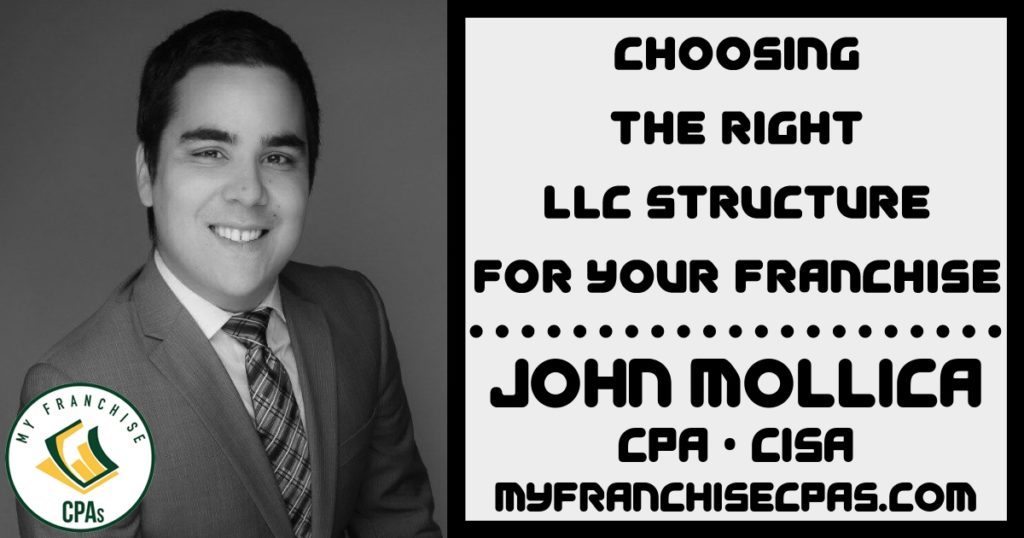
LLC vs. S-Corp vs. Sole Proprietorship – Which one is Right for Your Franchise?
Wondering what is the best LLC structure for your franchise? The entity type you choose will have a long-lasting impact on your franchise’s security and performance. Taxes, regulations and personal liability depend on how you form your enterprise. One of the more popular choices for entity structure is the Limited Liability Company (LLC).
You should keep a few things in mind when trying to decide if an LLC is right for you. First, you should know what your short and long-term business goals are. Consider your long-term goals when deciding whether an LLC is right for you.
What is an LLC?
An LLC is a unique type of private legal entity structure. It takes the beneficial tax effects of a partnership and combines them with the limited liability of a corporation.
An LLC is not a corporation. It’s a legal form of a business that offers limited liability in most states. LLCs are popular for their flexibility.
In most instances you can elect to be taxed as a corporation if you’d like, but be weary. Corporations are taxed twice: Once at the corporate level, and once on the personal level as you take draws.
Why choose an LLC for your franchise?
There are many entity structure options. You may feel tempted to choose the lead of many businesses and choose a corporation for your franchise. However, after hearing the many advantages to the LLC structure you’re likely to go this route.
Some of the benefits of the LLC structure include:
- Since an LLC is a separate legal entity from you, the owner, you can enjoy limited personal liability from the dealings of your business (with some exceptions).
- LLCs have less strict legal requirements as a corporation, as LLCs do not require board meetings. In addition, LLCs have less complex bookkeeping and accounting requirements than corporations.
- LLCs can choose pass through tax status (like sole proprietorships, partnerships and S-Corps) or a corporate tax status (like a C-Corp). The right election will lead to big tax savings each year.
- Ownership is flexible with an LLC, as foreign individuals and entities, as well as corporations can be owners (called members) of an LLC.
- An LLC can be owners and managed by one or more members and managers. There is no need for a strict hierarchy of management (officers, board members, secretaries etc.) as is required with corporations.
- Distribution of profits is simple. You simply cut distributions to members, as desired. There is no need for formal documentation (i.e. dividend announcements and distributions) as is required with corporations. Make sure to have an Operating Agreement for your LLC which determines who is entitled to what percentage of the LLC’s profits.
Benefits of an LLC vs Sole Proprietorship For Your Franchise
If you’re an aspiring franchisee, forming an LLC can offer you several benefits, given that it’s relatively easy to set up and maintain the business structure. LLCs help limit personal liability. Further, as a franchisee, if you’re looking for funding to cover the initial franchise fee and start-up costs, most banks and SBA brokers require you have a legal entity structure. This precludes the possibility of operating as a sole proprietor. In addition, operating as a sole proprietor puts your own assets at risk in case of legal trouble.
By forming an LLC, you protect your personal assets from any liability that your franchising activity might cause. In fact, LLCs offer the same degree of protection for franchisees as would a corporation while being much more simple and cheaper to establish.
There is no reason to choose the sole proprietor structure over an LLC for your franchise.
After all, LLCs are relatively easy and inexpensive to manage and offer flexible tax benefits.
Should You Choose an LLC or S-Corp For Your Franchise?
Whether you’re planning to start a franchise or change your existing franchise’s legal structure, an important step to take is to compare the pros and cons of using the LLC vs. S-Corp structures.
While similar in some ways, there are also distinct differences between them. Getting familiar with each can help you make the right choice for your franchise.
Here are some key differences between the LLC and S-Corp structures:
- An LLC is a business structure that is legally separate from its owners. In contrast, an S-Corp isn’t a type of business entity but rather a tax election that LLCs and corporations can make.
- LLCs offer protection to personal assets but incur self-employment tax. S-Corps have the ability to split between salaries and distributions of owners, the former of which incurs self-employment tax but the latter does not.
- The tax filing process of an LLC depends on how many members the LLC has. S-Corps have less flexibility, always requiring the filing of form 1120S and related K-1’s for each shareholder.
While the S-Corp tax status election may offer tax advantages over the LLC structure, this is not always the case.
Consult with your CPA or tax professional before choosing your legal entity structure.
Have a question? Feel free to ask!
Get industry insights from one of our franchise experts: info@MyFranchiseCPAs.com
More than just a simple question?
You can reach our digital calendar and schedule a call with one of our franchise experts here: https://myfranchisecpas.com/appointments/






